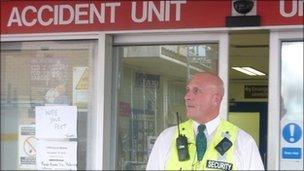A&E casualties' police tip-offs help cut Cardiff crime
- Published

A four-year study saw 42% fewer woundings in the city compared with 14 similar cities
Information gathered from casualties admitted to A&E has been helping police target crime "hotspots" in Cardiff, reducing cases of violence.
A four-year study saw 42% fewer woundings in the city compared with 14 similar cities in England and Wales.
The World Health Organisation (WHO) is now calling for the project to be rolled out in other countries.
Researchers say police could use such information, which can go unreported, to deploy resources more effectively.
Details from hospital such as the location, time, days and weapons involved in violence - all anonymised so no victims could be identified - were shared with police and led to a "substantial and significant reduction" in violence.
The study, external, published on the British Medical Journal website, also showed the reduction was accompanied by an increase in minor assaults which did not result in injuries.
This suggested "that more accurate targeting led to faster and more frequent police intervention".
The Cardiff Violence Prevention Programme was led by Jonathan Shepherd, professor of oral and maxillofacial surgery at Cardiff University's School of Dentistry.
"Violence prevention can be increased if intelligence from the local A&E department is used in collaboration with the police intelligence," he said.
"That improved data about unreported crime enables police to be at violence hot spots more frequently and therefore to intervene earlier and more frequently than they would otherwise have done."
Prof Shepherd added that the information enabled police to identify a venue where many people were being injured in violence, but not contacting the police.
Significant contribution
Officers could then make sure they were around to intervene more quickly, stopping violence sooner or reviewing a venue's licence.
The study found "information sharing and use were associated with a substantial and significant reduction in hospital admissions related to violence".
The Cardiff hospital involved has not been named in the report but is believed to be the University of Wales Hospital.
In an accompanying report, Alexander Butchart, from the WHO, said: "In light of its large effect on preventing violence, this model will hopefully be emulated by other cities in developing and developed countries."
Divisional Commander for Cardiff Ch Supt Alun Thomas said: "Crime in South Wales is at a 25-year low and the A&E information sharing scheme has played a significant contribution to this reduction.
"The scheme gives have access to anonymous information on a regular basis which tells us where and when violent crime has occurred.
"This allows us and our partners to put officers and other resources in the right place at the right time to pre-empt any offences and prevent crime.
"This is an excellent example of how the Safer Capital Partnership is making a real difference to keeping our communities safe," Mr Thomas said.
"We lead the UK in this kind of work and therefore we are delighted that the coalition government is committed to ensuring hospitals throughout England and Wales adopt the same way of working."
- Published10 June 2011
- Published13 April 2011